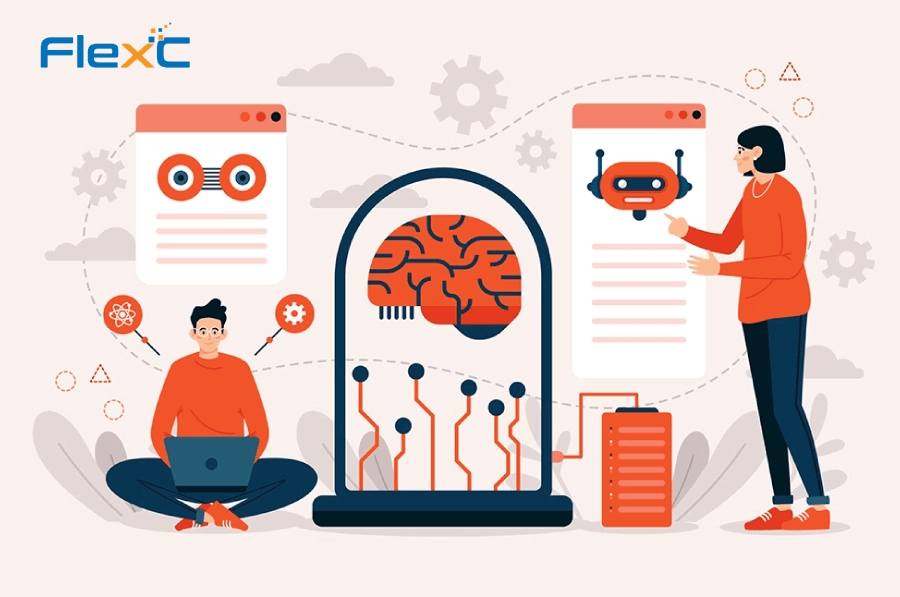5 Ways AI Will Help HR Sustain Their Hybrid Workforce

A hybrid workforce is a combination of contractors, remote andfull-time employees working in a flexible setting. A hybridworkforce has the convenience to choose their work space. Thismeans they can opt whether they want to work remotely, from theoffice, or want a blend of both.
As the hybrid work culture is gaining prominence across theglobe, India as well has been embracing it with open arms. BothIndian businesses and MNCs in the Indian markets are looking forways to transform their workforce, from traditional to hybrid. Astudy by an Australian research agency called PaperGiant hasrevealed that 66% of Indian employees wish to work from homepermanently. Furthermore, 70% of people reported having betterjob satisfaction since the pandemic.
The new normal has created a unique opportunity for markets andemployees to re-think their ways of working. A hybrid workforceis undoubtedly expected to become the new work norm. Thereforeit will become important for HR to rely on relevant technologiessuch as Artificial intelligence, and big data analytics tosuccessfully manage the employees spread across the globe.
5 Ways AI Can Support a Hybrid Workforce
In a report, the Economist has referred to adoption to the newtechnologies as tech-celeration
citing how the pandemic hasaccelerated the trends of technology adoption among industries.
In the rapidly growing world, implementing AI technology isbecoming a necessity for organizations. Here’s how with the helpof AI, HR managers can successfully manage their hybridworkforce.
-
1 - Performance Management Solutions
The absence of a face-to-face office setting may make it difficult for managers to analyze employee productivity and pinpoint which employee is low on productivity. AI technology can provide data and insights which HR managers can analyze, find gaps, and work towards improving them. One thing HR will need to ensure is to respect employee’s privacy while extracting such data.
-
2 - Communication and Collaboration Solutions
Technology can help to connect hybrid teams. It will be especially helpful for those employees who are working remotely since the beginning and have hardly had any face-to-face interaction in the office. AR and VR-enabled video conferencing platforms will bring revolution in this sector, creating an inspiring environment for all the users around the world to meet, interact and collaborate. The combination of AR, VR along with artificial intelligence will be the cherry on top. With the help of this technology combination, HR can educate the next-gen employees with high-risk jobs.
-
3 - Learning and Upskilling Solutions
It is important for organizations to focus on learning and upskilling their employees if they want to match the fast-paced environment. AI algorithms help to create personalized training programs suiting every employee’s needs. AI can also help companies manage their internal talent marketplaces, connecting workers to new and suitable opportunities as per their skills.
-
4 - Empowering and Engaging the Workforce
Listening to employee’s grievances and how leaders and HR will respond to the same has become crucial, now more than ever. At times like these technologies such as the Voice of Employees (VoE), the analytics, driven by AI will be helpful. VoE can help leaders analyze what their employees have to say about the organization’s culture. The data will also help leaders track employee engagement and feedback, ensuring better relationships and positive change in the organization’s culture.
-
5 - Hiring Solutions
AI will transform the recruiting process by automating time-sucking tasks. HR managers can hand over mundane tasks such as job matching, emailing, scheduling, and screening processes in the hands of AI. This will help them to achieve desired, standardized, and more unbiased results. AI will help HRs to become more proactive and cultivate better relationships with candidates.
HR Trends We May See in Future Facilitating the Hybrid Culture.
Technology is the key ingredient that will help organizationsachieve their hybrid workforce goals. Without its properimplementation, it will be much harder for the organizations tosurvive in the current and in future scenarios. Here’s a list offuture trends that may be set in motion in the HR space.
-
Chatbots:
These are expected to resolve many HR and employee-related issues by providing simplified solutions to tasks like updating employee’s personal information, streamlining recruiting experience by handling applicant screening and scheduling process.
-
Digital Twins:
After the sudden shock organizations got to face during the pandemic, they are now preparing their systems to be more resilient and efficient. Implementing a digital twin technology will provide HR workplace insights using real-world data. The use of digital twins will enable HR to experiment with different contingent scenarios and check if the organization is ready for any uncertainty.
-
Health Tech:
Organizations are realizing the positive impact of focusing on employee’s health and happiness on business. Hence the future may see health tech making a significant place in HR. With the help of AI, HR will be able to provide physical, mental, and emotional support to employees.
-
Smart Building IoT Devices:
These devices provide users complete control over the building’s functions such as lighting, space, security, and assets. The real-time data generated with the Smart building IoT devices will help HR to measure how the building is utilized. This will help HR optimize building spaces while making them safe and engaging for employees at the same time.
-
Dependence on SaaS platforms:
The future HR will be more reliant on AI to support them with the organization’s hiring needs. HRs will walk holding the hand of SaaS platforms like FlexC, which will help them to hire and manage their hybrid workforce, and simplify sourcing the talent process.